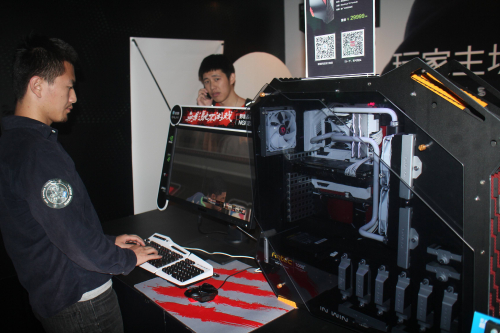|
 |
|
GAMER PARADISE: An e-game enthusiast tries out the latest hardware products displayed at the 2014 NVIDIA ESPORTS expo in Shanghai on October 26 (CNSPHOTO) |
To parents, computer games mean nothing but bad news for children's health and their studies. Fans of online gaming, after fighting with their own parents for years, have proved a career in playing games such as Defense of the Ancients 2 (DOTA2), League of Legends (LoL) and Starcraft 2 could even be a lucrative one.
On July 22, the Chinese team Newbee won the International DOTA2 Competition held in Seattle, the United States. The team won $5 million, giving each of the five members $1 million to take home. Four other Chinese teams placed in the top 10 at the event, which was held in a 17,000 capacity stadium and watched online by 20 million unique viewers.
On October 5, Newbee won again at the World Cyber Arena held in China's Yinchuan, capital city of Ningxia Hui Autonomous Region, netting another 2 million yuan ($330,000).
This team, although formed only in March this year, has won $5.33 million in prize money within seven months.
Games get serious
It is believed that South Korea was the first country where e-sports became a lucrative business. In the late 1990s when South Korea was struggling with the 1997 Asian financial crisis, a new game, called Starcraft, made by U.S. company Blizzard gained notorious popularity among youth at the time. In a bid for more viewers, some TV channels in South Korea started to make programs about the game. The programs were an unexpected success and spurred a whole chain of profitable enterprises.
By 2004, the annual output of the e-sports industry had reached $4 billion in South Korea, more than even the local automobile industry.
Chinese players saw the potential development of this new form of competition also. In 2000, Starcraft player Han Yuliang made a post at a game forum discussing the possibility of training professional Starcraft players. Han even went to Beijing looking for a way to make this idea a reality, but he ultimately failed.
Han was not alone, however. In 2001, a group of game players formed 8DA Club in Chongqing Municipality. It was the first e-sports club in China. Over time, a number of other clubs opened around the country.
In 2003, China's General Administration of Sport listed e-sports as an officially recognized sport. The formality made little difference to the situation, however, as at that time the number of people involved in the industry were too few.
In 2008, Wu Sheng, a student majoring in biology in Zhejiang University based in east China, was in the winning team at the DOTA Asian championship at the World Cyber Games (WCG). His team Ehome took home more than 10,000 yuan ($1,631) in prize money. Wu's triumph inspired other DOTA players.
In 2009, Wu formed his own team, at first named FTD, but later known as LGD. LGD went on to win the Intel Extreme Masters (IEM) championship in the same year.
When Wu first made waves as a DOTA player, Jian Zihao was only 11 years old. Born in 1997, Jian stepped into the world of e-sports at a young age and was only 15 when he was on the winning team of the League of Legends championship at the Tencent Games Arena (TGA) championship in 2012.
At 16 years of age, Jian and his teammates won the silver medal at League of Legends World Championship in 2013—the biggest event for the game on the e-sports calendar. The result, so far, is still the best result that a Chinese team has ever got in this competition.
"Like other competitive sports, e-sports players also have an age at which they will be in their prime," said Jian. "I believe it to be about 15-22. Even though I am now 17, I can still feel I am a bit slower than I was last year. The sport demands very fast reactions."
"There are still many people that can't tell the difference between e-sports and computer games," said Jian. "At first, my parents were against me playing e-sports games but they changed the attitude after I proved how much I could achieve," said Jian.
| 